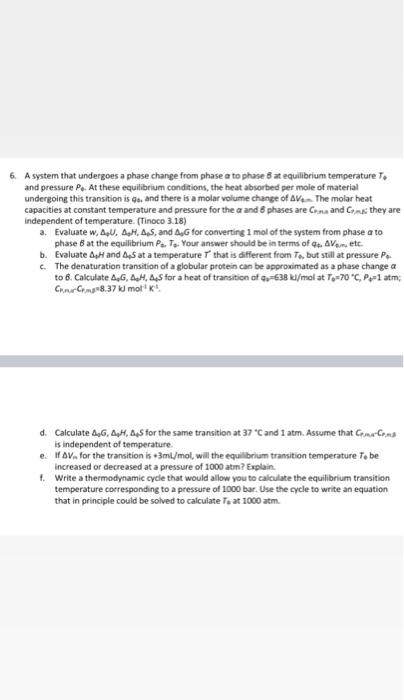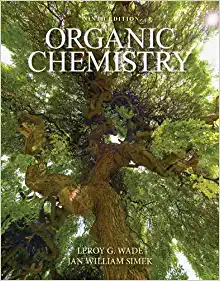PARTS E AND F ONLY PLEASE :)

6. A system that undergoes a phase change from phase a to phase B at equilibrium temperature T4 and pressure P4. At these equilibrium conditions, the heat absorbed per mole of material undergoing this transition is qb a and there is a molar volume change of V4= The molar heat capacities at constant temperature and pressure for the a and 6 phases are Cn ma and C7 they are independent of temperature. (Tinoco 3.18) a. Evaluate w,4U,4H,6S, and 4G for converting 1 mol of the system from phase a to phase B at the equilibrium P,T. Your answer should be in terms of qtVomp etc. b. Evaluate 4H and 4S at a temperature T that is different from T, but still at pressure P4. c. The denaturation transition of a globular protein can be approximated as a phase change a to 6. Calculate 4G,4H4,4S for a heat of transiticn of q0=E38k/ mol at T6=70C8,4=1atm; Cparchmen 8.37kjmol1K1. is independent of temperature. e. If Vn for the transition is +3mL/mol, will the equilbrium transition temperature T0 be increased or decreased at a pressure of 1000 atm? Explain. f. Write a thermodynamic cycle that would allow you to calculate the equilibrium transition temperature corresponding to a pressure of 1000 bar. Use the cycle to write an equation that in principle could be solved to calculate Tt at 1000 atm. 6. A system that undergoes a phase change from phase a to phase B at equilibrium temperature T4 and pressure P4. At these equilibrium conditions, the heat absorbed per mole of material undergoing this transition is qb a and there is a molar volume change of V4= The molar heat capacities at constant temperature and pressure for the a and 6 phases are Cn ma and C7 they are independent of temperature. (Tinoco 3.18) a. Evaluate w,4U,4H,6S, and 4G for converting 1 mol of the system from phase a to phase B at the equilibrium P,T. Your answer should be in terms of qtVomp etc. b. Evaluate 4H and 4S at a temperature T that is different from T, but still at pressure P4. c. The denaturation transition of a globular protein can be approximated as a phase change a to 6. Calculate 4G,4H4,4S for a heat of transiticn of q0=E38k/ mol at T6=70C8,4=1atm; Cparchmen 8.37kjmol1K1. is independent of temperature. e. If Vn for the transition is +3mL/mol, will the equilbrium transition temperature T0 be increased or decreased at a pressure of 1000 atm? Explain. f. Write a thermodynamic cycle that would allow you to calculate the equilibrium transition temperature corresponding to a pressure of 1000 bar. Use the cycle to write an equation that in principle could be solved to calculate Tt at 1000 atm








